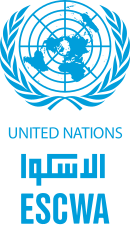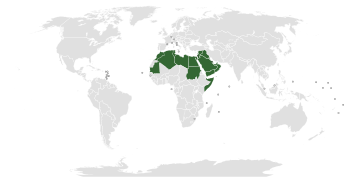United Nations Economic and Social Commission for Western Asia
This article may require cleanup to meet Wikipedia's quality standards. The specific problem is: needs depth and context, reads in part like a brochure (March 2017) (Learn how and when to remove this template message) |
 | |
 | |
| Abbreviation | ESCWA |
|---|---|
| Formation | 9 August 1973 (1973-08-09) |
| Type | Primary Organ - Regional Branch |
| Legal status | Active |
| Headquarters | Beirut, Lebanon |
Head | Acting Executive Secretary of the United Nations Economic and Social Commission for Western Asia Mounir Tabet |
Parent organization | United Nations Economic and Social Council |
| Website | www.unescwa.org |
The United Nations Economic and Social Commission for West Asia (ESCWA; Arabic: الإسكوا) is one of five regional commissions under the jurisdiction of the United Nations Economic and Social Council. The role of the Commission is to promotes economic and social development of Western Asia through regional and subregional cooperation and integration.
The Commission is composed of 18 Member States, all from the North African and Middle East regions.[1]
The Commission works closely with the divisions of the Headquarters in New York and United Nations specialized agencies, as well as with international and regional organizations. Some of its regional partners include: the League of Arab States, the Gulf Cooperation Council and the Organisation of Islamic Cooperation.[2]
Contents
1 History
2 Member States
3 Locations
4 Executive Secretaries
5 Funding
5.1 Regular budget
5.2 Regular programme of technical cooperation (RPTC)
5.3 Development account
5.4 Extrabudgetary projects
6 Israel-Palestine report controversy
7 See also
8 References
9 Bibliography
10 External links
History
The Commission was first established by the Economic and Social Council on 9 August 1973 as the United Nations Economic Commission for Western Asia (ECWA). The Commission was the successor to the United Nations Economic and Social Office in Beirut (UNESOB), which was absorbed into the framework of ECWA.[3] Its main mandate was to "initiate and participate in measures for facilitating concerted action for the economic reconstruction and development of Western Asia." [4]
On 26 July 1985, in recognition of the social component of its work, the Commission was renamed to the United Nations Economic and Social Commission for Western Asia (ESCWA) by the Economic and Social Council.[5][2]
Member States

A map showing the Member States of the Commission.
The following are all Member States of the Commission:[1]
 Bahrain
Bahrain
 Egypt
Egypt
 Iraq
Iraq
 Jordan
Jordan
 Kuwait
Kuwait
 Lebanon
Lebanon
 Libya
Libya
 Mauritania
Mauritania
 Morocco
Morocco
 Oman
Oman
 Palestine
Palestine
 Qatar
Qatar
 Saudi Arabia
Saudi Arabia
 Sudan
Sudan
 Syrian Arab Republic
Syrian Arab Republic
 Tunisia
Tunisia
 United Arab Emirates
United Arab Emirates
 Yemen
Yemen
Locations

The Commission's Headquarters are located in Beirut.
The Commission's headquarters have been located in the Central District of Beirut, Lebanon since 1997. Prior to this, the headquarters moved between various cites. The first headquarters of the Commission were located in Beirut from 1974-82. They then moved to Baghdad, Iraq, from 1982-91. Finally, they were located in Amman, Jordan, from 1991-97 before moving back to Beirut.[2]
Executive Secretaries
The following is a list of the Executive Secretaries of the Commission since its foundation:[6]
| Term | Name of Executive Secretary | Home Country |
|---|---|---|
| 1974-1985 | Mohammad Said Al-Attar | |
| 1985-1988 | Mohammad Said Al-Nabulsi | |
| 1989-1993 | Tayseer Abdel Jaber | |
| 1993-1995 | Sabbaheddin Bakjaji | |
| 1995-2000 | Hazem El Beblawi | |
| 2000-2007 | Mervat Tallawy | |
| 2007-2010 | Bader Al-Dafa | |
| 2010-2017 | Rima Khalaf | |
| 2017-2018 | Mohamed Ali Alhakim | |
| 2019- | Rola Dashti |
Funding
The budget of Commission comes mainly from contributions from the United Nations, but also from donations from governments, regional funds, private foundations and international development agencies. In 2017, the total budget of the Commission was $27.4 million.[7] Additionally, since 2014, the Commission has received $7.1 million in voluntary contributions to help implement national and regional activities.[8]
The Commission has four main budgets: the regular budget, the regular programme of technical cooperation (RPTC), the development account and the extrabudgetary projects account.
Regular budget
The regular budget line item is voted on by the United Nations General Assembly on a biennial basis and provides the Commission with resources fulfill its mandate as laid out in the Strategic Framework. In 2017, the regular budget was $19.9 million.[7]
Regular programme of technical cooperation (RPTC)
The regular programme of technical cooperation line item works to support Member States in formulating sustainable socioeconomic development policies. It fosters cooperation, creates knowledge networks and promotes the sharing of experience between countries. In 2017, the regular programme of technical cooperation budget was $2.3 million.[7]
Development account
The development account line item helps fund capacity building projects at national, subregional, regional and interregional levels. In 2017, the development account budget was $1.9 million.[7]
Extrabudgetary projects
The extra budgetary projects line item supports economic and social development under the seven subprograms of the Commission: Economic Development and Integration, Gender and Women Issues, Governance and Conflict Issues, Natural Resources, Social Development, Statistics and Technology for Development. In 2017, extra budgetary projects budget was $3.2 million.[7]
Israel-Palestine report controversy
On March 15, 2017, UNESCWA released a report accusing Israel (not a UNESCWA member state) of being an "apartheid regime" due to Israel's relations with Palestinians both inside and outside Israel.[9] This report proved controversial, and it was ultimately withdrawn and removed from UN websites after criticism from the Secretary General that it had been issued by ESCWA without approval.[10]
The document was authored by Richard Falk, professor of International Law and Practice Emeritus at Princeton University and a former U.N. human rights investigator for the Palestinian territories, and Virginia Tilley, professor of Political Science at Southern Illinois University.[11]Rima Khalaf, United Nations Under-Secretary-General and Executive Secretary of the ESCWA, had said it was the first to accuse Israel of being a racist state.[dubious ][citation needed] The report itself said it had established on the "basis of scholarly inquiry and overwhelming evidence, that Israel is guilty of the crime of apartheid". Israel has condemned the report. "We expected of course that Israel and its allies would put huge pressure on the secretary general of the UN so that he would disavow the report, and that they would ask him to withdraw it," Khalaf said to AFP.[12]
The UN Secretary-General António Guterres had distanced himself from the report [13] and the document was removed from UN website on Friday, March 17, 2017.[14] The report Executive Summary was also deleted from the United Nations Information System on the Question of Palestine (UNISPAL) [15]
On March 17, Khalaf submitted her resignation to Mr Guterres. "I resigned because it is my duty not to conceal a clear crime, and I stand by all the conclusions of the report," she stated.[16]
The full report is still available on Archive.org.[17]
See also
- United Nations System
United Nations Economic Commission for Africa (overlapping membership)
References
^ ab United Nations Economic and Social Commission for West Asia (n.d.). "ESCWA Member Countries in Alphabetical Order as Designated by the United Nations" (PDF). United Nations Economic and Social Commission for West Asia. United Nations. Retrieved 23 December 2018..mw-parser-output cite.citation{font-style:inherit}.mw-parser-output .citation q{quotes:"""""""'""'"}.mw-parser-output .citation .cs1-lock-free a{background:url("//upload.wikimedia.org/wikipedia/commons/thumb/6/65/Lock-green.svg/9px-Lock-green.svg.png")no-repeat;background-position:right .1em center}.mw-parser-output .citation .cs1-lock-limited a,.mw-parser-output .citation .cs1-lock-registration a{background:url("//upload.wikimedia.org/wikipedia/commons/thumb/d/d6/Lock-gray-alt-2.svg/9px-Lock-gray-alt-2.svg.png")no-repeat;background-position:right .1em center}.mw-parser-output .citation .cs1-lock-subscription a{background:url("//upload.wikimedia.org/wikipedia/commons/thumb/a/aa/Lock-red-alt-2.svg/9px-Lock-red-alt-2.svg.png")no-repeat;background-position:right .1em center}.mw-parser-output .cs1-subscription,.mw-parser-output .cs1-registration{color:#555}.mw-parser-output .cs1-subscription span,.mw-parser-output .cs1-registration span{border-bottom:1px dotted;cursor:help}.mw-parser-output .cs1-ws-icon a{background:url("//upload.wikimedia.org/wikipedia/commons/thumb/4/4c/Wikisource-logo.svg/12px-Wikisource-logo.svg.png")no-repeat;background-position:right .1em center}.mw-parser-output code.cs1-code{color:inherit;background:inherit;border:inherit;padding:inherit}.mw-parser-output .cs1-hidden-error{display:none;font-size:100%}.mw-parser-output .cs1-visible-error{font-size:100%}.mw-parser-output .cs1-maint{display:none;color:#33aa33;margin-left:0.3em}.mw-parser-output .cs1-subscription,.mw-parser-output .cs1-registration,.mw-parser-output .cs1-format{font-size:95%}.mw-parser-output .cs1-kern-left,.mw-parser-output .cs1-kern-wl-left{padding-left:0.2em}.mw-parser-output .cs1-kern-right,.mw-parser-output .cs1-kern-wl-right{padding-right:0.2em}
^ abc United Nations Economic and Social Commission for West Asia (n.d.). "About ESCWA". United Nations Economic and Social Commission for West Asia. United Nations. Retrieved 23 December 2018.
^ Union of International Associations (n.d.). "United Nations Economic and Social Office in Beirut (UNESOB)". Union of International Associations. Union of International Associations. Retrieved 23 December 2018.
^ United Nations Economic and Social Council Resolution 1818(LV). Establishment of and Economic Commission for Western Asia E/RES/1818(LV) 9 August 1973. Retrieved 23 December 2018.
^ United Nations Economic and Social Council Session 1985 Resolution 69. Amendment of the terms of reference of the Economic Commission for Western Asia: change of name of the Commission E/RES/1985/69 26 July 1985. Retrieved 23 December 2018.
^ Dag Hammarskjöld Library (24 August 2018). "Economic and Social Commission for Western Asia (ESCWA)". Dag Hammarskjöld Library. United Nations. Retrieved 23 December 2018.
^ abcde United Nations Economic and Social Commission for West Asia (2018). "ESCWA Annual Report 2017". United Nations Economic and Social Commission for West Asia. United Nations. Retrieved 23 December 2018.
^ United Nations Economic and Social Commission for West Asia (n.d.). "Donors". United Nations Economic and Social Commission for West Asia. United Nations. Retrieved 23 December 2018.
^ ESCWA Launches Report on Israeli Practices Towards the Palestinian People and the Question of Apartheid. United Nations Economic and Social Commission for Western Asia, 15 March 2017.
^ Times of Israel Staff and AFP (March 17, 2017). "UN chief orders report accusing Israel of 'apartheid' pulled from web". www.timesofisrael.com. Retrieved March 17, 2017.
^ Israel imposes 'apartheid regime' on Palestinians: U.N. report. Reuters, March 16, 2017.
^ UN's Rima Khalaf quits over report accusing Israel of apartheid. BBC News, 17 March 2017.
^ Times of Israel Staff and AFP (March 17, 2017). "UN chief orders report accusing Israel of 'apartheid' pulled from web". www.timesofisrael.com. Retrieved March 17, 2017.
^ Times of Israel Staff and Agencies (March 17, 2017). "Head of UN body resigns as her group's anti-Israel report is withdrawn". www.timesofisrael.com. Retrieved March 17, 2017.
^ "Israeli Practices towards the Palestinian People and the Question of Apartheid - ESCWA Report Executive Summary (15 March 2017)". The United Nations Information System on the Question of Palestine (UNISPAL). March 15, 2017. Retrieved March 18, 2017.
^ UN official resigns after pressure to withdraw Israel apartheid report. By Ali Abunimah. The Electronic Intifada, 17 March 2017.
^ "Israeli Practices towards the Palestinian People and the Question of Apartheid - ESCWA Report (15 March 2017)" (PDF). The United Nations Information System on the Question of Palestine (UNISPAL). March 15, 2017. Archived from the original (PDF) on March 16, 2017. Retrieved March 28, 2017.
Bibliography
- Paul Berthoud, A Professional Life Narrative, 2008, worked with UNESOB and offers testimony from the inside of the early years of the organization.
External links
- UN Economic and Social Commission for Western Asia
- ESCWA Executive Secretary
- Information about ESCWA
- Official Document System of the United Nations
Coordinates: 33°53′41″N 35°30′08″E / 33.8946°N 35.5021°E / 33.8946; 35.5021
